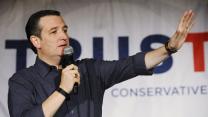By Rick Newman 20 hours ago

There’s nothing wrong with a candidate taking bank loans to help finance his campaign, as Ted Cruz did when he first ran for the Senate in Texas in 2012. But failing to report those loans, as Cruz acknowledged doing after the New York Times uncovered the loans, is illegal.
Not going-to-jail illegal, however. The Federal Election Commission, which enforces campaign-finance laws, is generally viewed as one of the weakest regulatory agencies in Washington, reluctant to press violators too hard—especially members of Congress who must approve its budget every year. A Cruz spokeswoman has already said the failure to disclose was "inadvertent," and the candidate will update the necessary reports. But the FEC may still investigate and fine Cruz for the error. If Cruz wants to wrap up the loan controversy quickly, he'll acquiesce to the FEC's demands.
But that depends on Cruz’s willingness to bow before a federal agency, and Cruz is notoriously hostile toward government authority. So it’s possible Cruz could fight any FEC enforcement effort, prolonging the controversy. “If he’s smart, he’ll start amending these reports immediately and say it was a misunderstanding,” says Larry Noble of the nonprofit Campaign Legal Center. “But it could get complicated.”
Cruz, according to the Times, took loans totaling about $1 million from two Wall Street banks: Goldman Sachs (GS) and Citibank (C). The Goldman loan is a particular eyebrow-raiser because Cruz’s wife, Heidi Cruz, is a Goldman executive (who’s on leave while Cruz campaigns).
Cruz took out the loans in the first half of 2012, when he was being heavily outspent in the Republican Senate primary by David Dewhurst, the wealthy Texas lieutenant governor, who was pouring millions of dollars of his own money into the campaign. Dewhurst beat Cruz in the primary but failed to win 50% of the votes, forcing a two-way runoff. Cruz came roaring back and won the runoff two months later. With a weak Democratic opponent in the general election, Cruz easily won the Senate seat vacated by Kay Bailey Hutchison.
A lot of candidates take out loans to help fund a campaign. As long as Cruz got his own loans on normal terms—at an interest rate comparable to market rates, with no sweetheart terms—the loans ought to be legit in their own right. The Times characterized the Goldman loan as a “low-interest” deal, but it’s worth pointing out that interest rates in general were at near-record lows back in 2012.
The two bank loans apparently went to the Cruzes personally, rather than to the campaign. That also isn’t unusual. If the loans were administered properly, the banks would have wanted collateral -- something a political campaign doesn’t really have. But the Cruzes did have collateral, such as investment accounts and other assets. The Cruzes then loaned the money they got from the banks to the campaign. That could be problematic, if the FEC digs deep enough, because if some of the money came from Heidi Cruz, it could be construed as a campaign donation subject to a limit of $5,400. The amount handed over to the campaign obviously exceeded that.
If Cruz plays nice with the FEC and accepts a modest penance, one question will still remain: Was the failure to disclose really inadvertent? There are reasons to be doubtful. "He's an extremely sophisticated guy," Carol Pepper of investing firm Pepper International says in the vide above. "His wife certainly knew. She works at Goldman. These are not hicks. For him not to be disclosing this, it's ridiculous."
Were he truly willing to break the rules, Cruz might have had reason to keep the bank loans a secret. For one thing, they gave his campaign a lifeline at a crucial moment of the race, when announcing the need for loans might have made his campaign seem underfunded and vulnerable.
As the Times points out, Cruz was also cultivating a homespun image of husband and wife risking their own life savings on a cause they believed in, which would seem a lot less endearing if the public knew it was bankrolled, at least in part, by Wall Street money. Plus, Cruz may have felt it was prudent to keep Goldman Sachs, his wife’s employer, off the books, since it might look like cronyism or, at a minimum, an unusual privilege.
The FEC has cut back on fines for campaign finance violators in recent years—but still acted in some cases. Last spring, it fined Democratic Ohio Congresswoman Marcy Kaptur $6,400 for the late reporting of a large donation. In 2014, the agency fined retired Democratic Congressman Edolphus Towns of New York $5,000 for the personal use of campaign funds while he was still in office. Not exactly eye-popping fines.
Ted Cruz can certainly afford a slap on the wrist, since his net worth is at least $3 million. He’s also unlikely to run short of campaign funds ever again. Cruz is one of the better-funded candidates in a crowded field competing for donors. His presidential campaign has raised at least $45 million so far, with super PACs supporting Cruz pulling in at least $40 million more. And his fundraising pace is accelerating as he surges in the polls. Taking out those loans in 2012 appears to have been a prudent risk, even if they weren’t prudently reported.
Rick Newman’s latest book is Liberty for All: A Manifesto for Reclaiming Financial and Political Freedom. Follow him on Twitter: @rickjnewman.
Above is from: http://finance.yahoo.com/news/how-ted-cruz-fixes-the-goldman-sachs-loan-scandal-181559074.html#

No comments:
Post a Comment